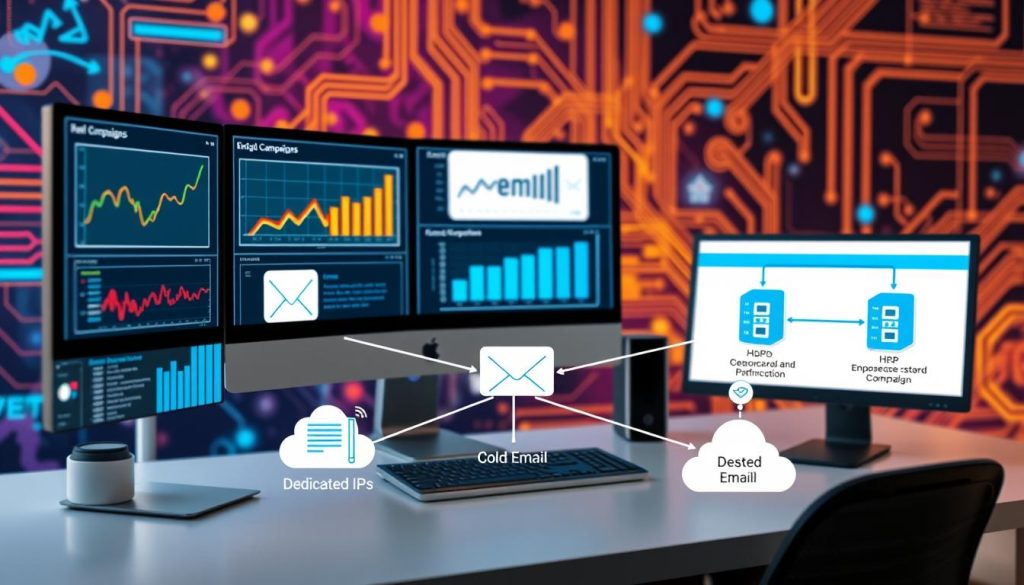Dedicated IP addresses are key for successful email campaigns. They help build a trusted sender reputation and ensure emails get delivered. But, using dedicated IPs wrong can harm your cold email outreach. This includes getting blacklisted, seeing low open rates, and damaging your brand’s reputation.
A huge 90% of major email providers use complex algorithms. These algorithms look at many things, like how people engage with emails and the domain’s reputation. They help fight spam effectively.
In this guide, we’ll explore common mistakes with dedicated IPs in cold email campaigns. We’ll also share strategies to avoid these issues. You’ll learn about IP warm-up, sender reputation management, and more. This will help you succeed in your cold email outreach efforts.
Key Takeaways
- Dedicated IP addresses are critical for effective and profitable email campaigns, but their improper usage can lead to significant deliverability issues.
- Email providers employ advanced algorithms to detect and mitigate spam, considering a wide range of factors including engagement metrics, complaints, and domain reputation.
- Proper IP warm-up and sender reputation management are essential to avoid pitfalls like blacklisting and low open rates in cold email outreach.
- Understanding the differences between shared and dedicated IP setups, as well as best practices for email infrastructure and list hygiene, is crucial for successful cold email campaigns.
- Continuous monitoring, optimization, and compliance with legal and industry standards are necessary to maintain a healthy email program and maximize deliverability.
Introduction to Dedicated IPs and Cold Emails
Choosing the right IP address is key for cold email success. Dedicated IP Addresses and Shared IP Addresses have different effects on your campaigns. They can change how well your emails are received.
What is a Dedicated IP?
A Dedicated IP Address is for one user, website, or company. It’s different from a Shared IP, which many use. Big email senders, like those sending over 3,000 emails daily, often use Dedicated IPs.
The Role of IPs in Cold Email Campaigns
An IP’s reputation is vital for being seen as a trustworthy sender. Bad IP reputations can send emails straight to spam. Keeping a good IP Address Reputation is key for better Cold Email Deliverability.
“Cold emailing is considered one of the best ways to generate sales leads for B2B companies.”
It’s important to understand Dedicated IP Addresses and their role in cold email campaigns. This knowledge helps businesses reach more potential customers.
Common Pitfalls When Using Dedicated IPs in Cold Email Campaigns
Dedicated IP addresses give businesses more control over their sender reputation. But, they also come with unique challenges. Two major pitfalls are improper IP warm-up and poor sender reputation management.
Improper IP Warm-up
Launching a successful cold email campaign with a dedicated IP requires a warm-up process. If you don’t gradually increase email volume and frequency, ISPs might see the IP as suspicious. This could lead to the IP being blacklisted, severely hurting email deliverability.
Poor Sender Reputation Management
Dedicated IPs are not as forgiving as shared IP pools. Senders must be very careful to keep a good sender reputation. Any issues with spam complaints, high bounce rates, or other negative metrics can quickly lead to the IP being blacklisted. This exposes the business to Email Deliverability Risks.
To avoid these Dedicated IP Warm-up and Sender Reputation Management pitfalls, businesses must invest time and resources. They need to properly warm up their dedicated IP and watch their sender reputation closely. Ignoring these key factors can lead to IP Blacklisting and the failure of their cold email campaigns.
Sender Reputation: The Key to Email Deliverability
In email marketing, a sender’s reputation is key to getting emails delivered. It’s based on your IP and domain reputation. Knowing how to manage these can greatly improve your cold email campaigns.
IP Reputation vs. Domain Reputation
IP reputation is about the IP address your emails come from. With a dedicated IP, you control your reputation. But, you’re also fully responsible for it. A shared IP can help if others have good reputations, but bad practices can hurt yours.
Domain reputation is about the brand or organization sending emails. It grows over time with quality content and subscriber engagement. A strong domain reputation can help with IP issues, making it vital for your email strategy.
“1 in 5 emails never reach the inbox due to poor email engagement and sender reputation, as reported by ReturnPath.”
To keep a good sender reputation, focus on email engagement. This includes open rates, click-through rates, and unsubscribe rates. A high unsubscribe rate can mean spam or bought lists, hurting your score. Hard bounces, or emails to non-existent addresses, also harm your reputation.
Understanding IP and domain reputation is crucial. By monitoring and improving your campaigns, you can get your emails to the right places. This builds strong relationships with your subscribers.
Mitigating Deliverability Risks with Dedicated IPs
Keeping your email deliverability high is key for any cold email campaign’s success. Dedicated IP addresses bring better security, helping to avoid deliverability issues. They give senders more control over important email authentication like SPF, DKIM, and DMARC. These help spot real emails and stop fake ones.
Email Authentication Protocols
Email authentication is crucial for keeping your sender reputation safe and making sure your emails get to the right people. With a dedicated IP, you can set up these protocols to match your domain. This creates a stronger security system and lowers the chance of your emails being seen as spam.
IP Blacklisting Prevention
Using a dedicated IP also lowers the risk of being blacklisted. When you share an IP with others, their actions can harm your IP’s reputation. This might block or filter your messages. But with a dedicated IP, you’re the only one responsible for its actions, so you’re less likely to get penalized for others’ mistakes.
Dedicated IPs need more technical know-how and upkeep. But they offer more control and security. This is especially good for businesses sending lots of emails and wanting to protect their reputation.
| Dedicated IP Advantages | Shared IP Advantages |
|---|---|
|
|
By knowing the perks of dedicated IPs and using strong email authentication, businesses can lower deliverability risks. This ensures their cold email campaigns reach the right people.

Choosing the Right IP Setup
Choosing between a Dedicated IP and a Shared IP Pool is key for cold email campaigns. Each option affects your email deliverability and sender reputation. Knowing the pros and cons is essential for success.
Dedicated IP vs. Shared IP Pools
A Dedicated IP is yours alone, offering full control over its reputation. It’s great for big senders, like those sending over 300,000 emails monthly. This setup helps you build a strong sender reputation over time.
Shared IP Pools are cheaper, with many senders using the same IP. While it’s cheaper, your deliverability can be affected by others. Yet, it lets you send emails right away, without a long warm-up.
| Dedicated IP | Shared IP Pool |
|---|---|
| Complete control over sender reputation | Reputation influenced by other senders |
| Requires gradual IP warm-up | Immediate email sending without warm-up |
| Generally higher monthly costs | Lower monthly costs |
| Recommended for high-volume senders | Suitable for smaller senders or those with good shared IP partners |
When picking between a Dedicated IP and a Shared IP Pool, think about your email volume and resources. Dedicated IPs give you more control but cost more. Shared IPs are cheaper but offer less control over your reputation.
Cold Email Infrastructure and Best Practices
Creating a strong cold email setup is key for good email delivery and campaign success. Choosing the right Email Service Provider (ESP) is vital. It should meet your cold email needs.
Email Service Provider Selection
The ESP you pick can make or break your cold email campaigns. Top ESPs include Mailforge, Infraforge, Mailscale, Maildoso, and Inframail. They offer features like dedicated IP addresses and email warm-up.
Mailforge starts at $3 per mailbox per month. It has email tracking and bulk campaigns. Infraforge offers quick setup and multi-IP options, priced from $2.5 to $4 per mailbox per month.
Email List Hygiene
Keeping your email list clean and segmented is essential. Regularly cleaning your list helps your sender reputation. This improves email delivery.
- Regularly review your email list and identify inactive or unresponsive subscribers.
- Segment your email list based on user characteristics, interests, or engagement levels to personalize your outreach.
- Implement email authentication protocols like SPF, DKIM, and DMARC to enhance the credibility of your email domain.
- Monitor key metrics, such as open rates, click-through rates, and bounce rates, to identify and address any deliverability issues.
Investing in the right cold email tools and following best practices boosts your outreach. This leads to better results for your business.

Monitoring and Optimization
In the world of cold email campaigns, keeping an eye on things and making adjustments is key. This is especially true when using a dedicated IP address. By tracking important email metrics, we can spot any problems or chances to get better. This helps us improve engagement and boost our campaign’s success.
Tracking Email Metrics
Looking at bounce rates, open rates, click-through rates, and unsubscribe rates gives us useful info. These numbers tell us if our emails are getting through and if people are interested. If we see a rise in bounce rates or a drop in open rates, we know we need to tweak our approach.
A/B Testing Strategies
A/B testing is a great way to keep improving our cold email campaigns. By trying out different subject lines, email content, and calls-to-action, we find what works best. This method helps us make smart choices and improve our Email Campaign Optimization efforts.
| Metric | Benchmark | Interpretation |
|---|---|---|
| Bounce Rate | Shows if there are problems with delivery or the email list quality | |
| Open Rate | > 20% | Tells us how good our subject lines and email content are |
| Click-Through Rate | > 2.5% | Shows if our email’s call-to-action is relevant and engaging |
| Unsubscribe Rate | Shows how good our email content is and if it’s relevant |
By keeping a close eye on these Email Metrics Tracking and always tweaking our campaigns with A/B testing, we keep our Deliverability Monitoring on track. This leads to better engagement and helps us meet our marketing goals.
Legal and Compliance Considerations
Businesses use email marketing to reach customers, but they must follow the law. They need to stick to rules like the CAN-SPAM Act in the U.S. and the GDPR in the EU. This keeps them out of trouble and helps them avoid fines.
The CAN-SPAM Act of 2003 guides commercial emails. It requires clear who sent the email, accurate subject lines, and an opt-out option. Not following these rules can lead to big fines.
The GDPR, from 2018, focuses on protecting personal data. This includes email addresses and other info that can identify someone. Companies must get clear consent before sending emails and explain how they’ll use the data.
Other countries have their own email and data laws too. For example, there’s the CCPA in California, CASL in Canada, and LGPD in Brazil. Keeping up with these laws is key to avoiding legal problems.
| Regulation | Key Requirements | Applicable Region |
|---|---|---|
| CAN-SPAM Act | Clear sender identification, accurate subject lines, opt-out option | United States |
| GDPR | Explicit consent, data privacy protection | European Union |
| CCPA | Personal data protection, transparency in data collection | California, United States |
| CASL | Consent requirements for commercial electronic messages | Canada |
| LGPD | Unified data privacy regulations | Brazil |
| PECR | UK counterpart to GDPR, combining UK law with GDPR principles | United Kingdom |
By knowing these Email Marketing Regulations and following best practices, businesses can stay compliant. This helps them keep a good reputation and makes their Email Marketing more effective.
Conclusion
Dedicated IP addresses are key to better cold email success. They offer more control over who sends emails and keep messages safe. This helps avoid common problems with shared IP pools and gets emails to the right people.
But, using dedicated IPs needs careful planning. You must manage your email list well and keep an eye on how your emails are doing. This ensures you get the most out of them.
Choosing between a dedicated or shared IP depends on your email marketing strategy. Consider your email volume, how you manage your sender reputation, and if you want more control. Knowing the benefits of dedicated IPs and following best practices can help you reach your audience better.
FAQ
What is a dedicated IP address?
A dedicated IP address is given to one user, website, or organization. It’s different from a shared IP address, which many use.
What is the role of IPs in cold email campaigns?
An IP’s reputation is key for sending emails. A bad reputation can send emails to spam instead of the inbox.
What are some common pitfalls when using dedicated IPs in cold email campaigns?
Common mistakes include not warming up the IP properly. This makes ISPs think it’s suspicious. Also, dedicated IPs are strict about reputation.
How do IP reputation and domain reputation impact email deliverability?
IP reputation is about the sending IP. Domain reputation is about the sender’s brand. A dedicated IP means you’re fully responsible for its reputation.
How can dedicated IPs help mitigate deliverability risks?
Dedicated IPs offer better security. They help control email authentication and reduce the risk of being blacklisted.
What are the main considerations when choosing between a dedicated IP and a shared IP pool?
Dedicated IPs give you full control but need more work. Shared IPs use others’ reputations but risk being affected by their actions.
What are some best practices for building a robust cold email infrastructure?
Choose a good email service provider. Keep your email list clean. Use email authentication protocols.
How can senders optimize their cold email campaigns?
Track your email metrics closely. Use A/B testing. Make decisions based on data to improve your campaigns.
What legal and compliance considerations should senders be aware of when running cold email campaigns?
Make sure your email practices follow laws like CAN-SPAM and GDPR. Your list, content, and delivery must be legal.
Source Links
- Cold Emailer’s Guide To Email Deliverability [2024 Update] – Replyify Blog
- Warm-up process for marketing senders – Dynamics 365 Customer Insights
- Migrating IPs? Don’t Forget the Warmup!
- Cold Email Marketing Guide – Everything You Need to Know
- Gmail Cold Email Limits: Maximizing Daily Sends Without Risking Your Account – Growleady
- cold email deliverability
- Shared IP vs. Dedicated IP: Making the Optimal Choice
- The false promises of dedicated IPs
- How Email Sender Reputation Affects Email Deliverability | Mailchimp
- Email Deliverability Guide 2024: Key Do’s & Don’ts
- IP Warming for Effective Email Marketing
- What are the Advantages of a Shared IP Address vs. a Dedicated IP Address?
- Dedicated vs. shared IPs for email: when to use each?
- Dedicated vs. Shared IPs: Knowing which one to use | Mailgun
- Dedicated vs. Shared IP: Which is Right For Your Emails?
- 5+ Best Cold Email Infrastructure Providers for 2024
- 5 Most Popular Cold Email Infrastructure Tools For B2Bs [2024]
- Optimize your sending reputation and deliverability with SES dedicated IPs | Amazon Web Services
- Email Deliverability
- How To Ensure Excellent Deliverability For a Cold Email Campaign? – US-Based B2B Leads Database With 98% Plus Accuracy
- Dedicated IP: The Key to Maximizing Email Deliverability | Mailchimp
- Email Marketing Laws 2023: Read This Before Sending Emails
- Email: Deliverability Recommendations
- The Complete Cold Email Deliverability Guide To Hit Inboxes
- Email IP Reputation 2024 Guide: Everything You Need to Know
- Dedicated vs Shared IPs: Which Should You Choose for Better Deliverability – GlockApps


